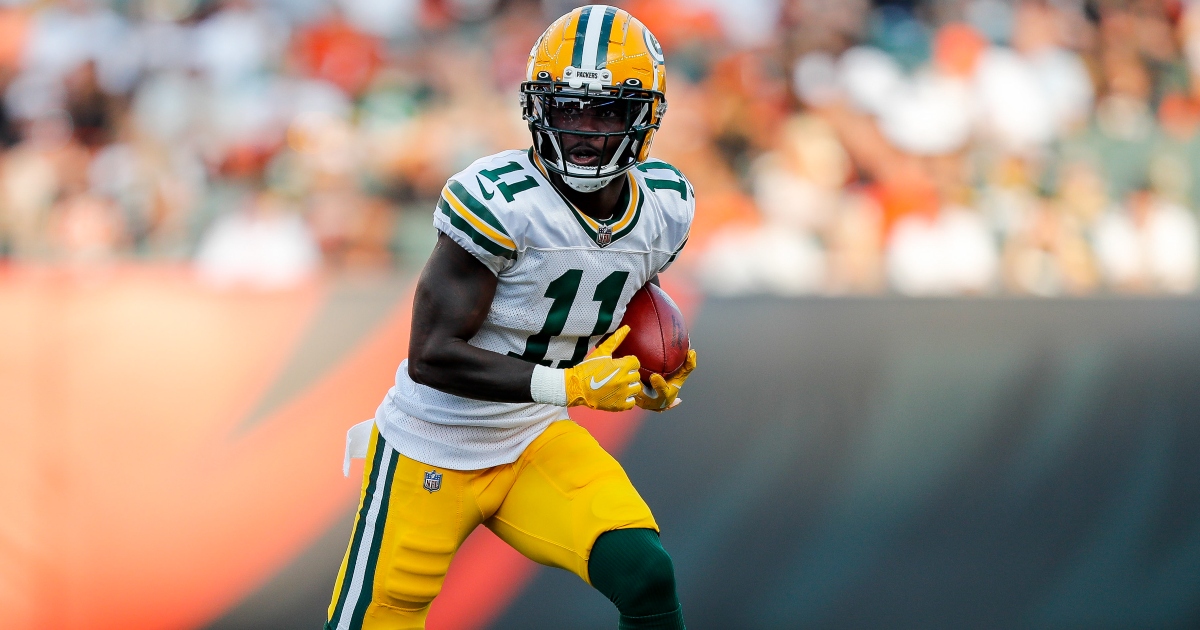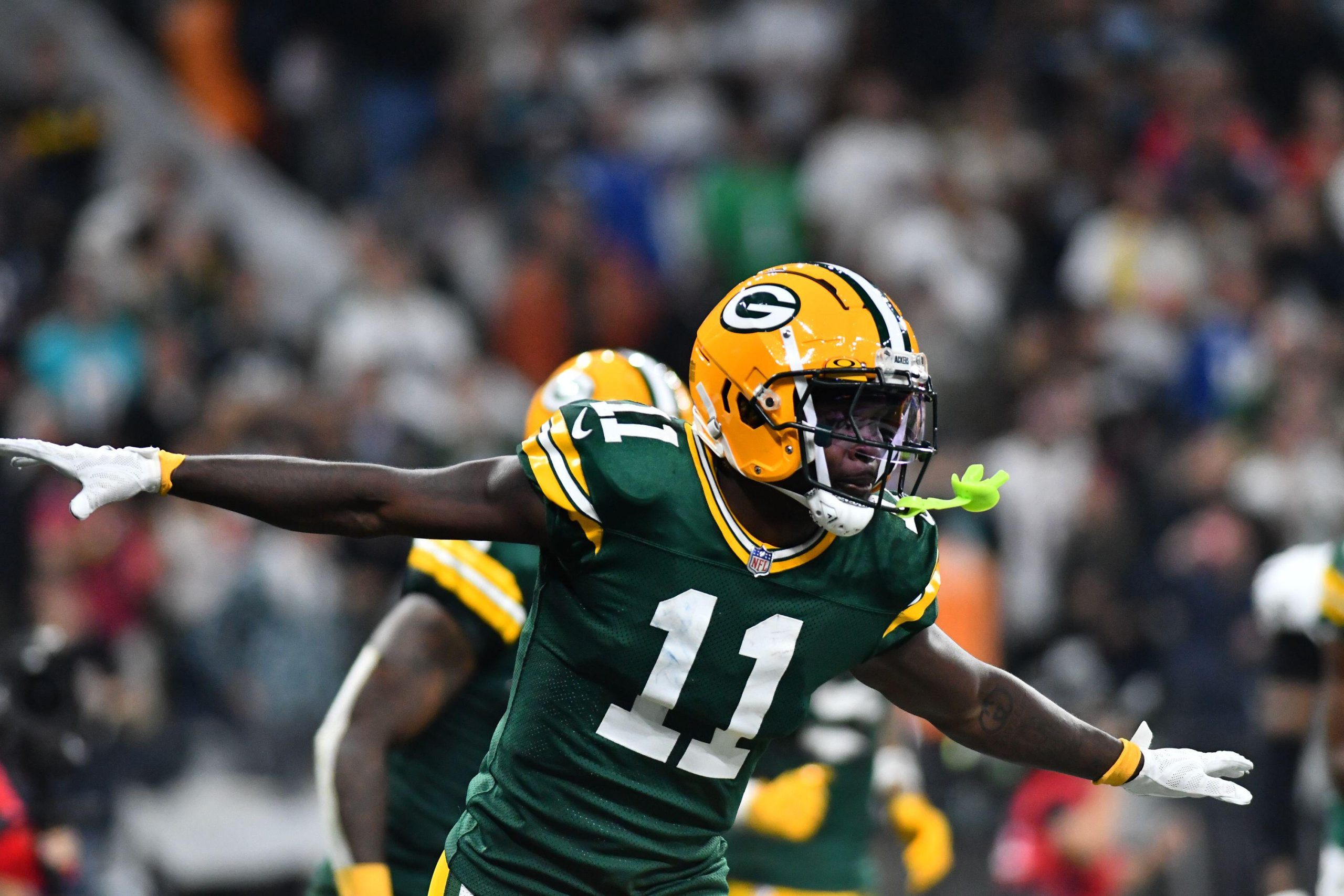‘He is a flat-out dog’
Courtney Hawkins still remembers the first practice. First time Michigan State’s receivers coach saw Reed on the field, he gasped at the speed. Reed needed something more. An edge to separate himself in one of college football’s most competitive conferences.
Hawkins was a former receiver with similar dimensions, standing 5-foot-9, 183 pounds when the Tampa Bay Buccaneers drafted him in the second round in 1992. He didn’t spend nine seasons in the NFL, splitting time with the Buccaneers and Pittsburgh Steelers, simply because he could run. Hawkins mastered the receiver position like a technician. He had a bevy of trade secrets.

With Reed, Hawkins was determined to instill what a decade in the league taught him.
“We needed to harp on fundamental route running,” Hawkins says, “and get him to realize that you can’t just depend on your speed and quickness. You’ve got to be fundamentally sound to be able to get in and out of breaks. Sometimes you’re going to have to be able to play physical. Because you are going to run up against guys who are as quick and as fast as you, and you’ve got to be sound from a fundamental standpoint.”
Reed was an insatiable student, Hawkins says. They spent hours on the phone, discussing what made a great receiver, carrying their conversations onto the practice field. “He would ask good questions,” Hawkins says. The queries often revolved around Hawkins’ playing career, how he got open as a receiver who didn’t tower over the secondary.

First, Hawkins had to teach Reed to thrive on college football’s biggest stage. In the NFL, defensive backs can’t touch receivers downfield. Deep routes morph into brawls in the Big Ten. “It’s not like Sundays,” Hawkins says. “The back end in the Big Ten can be a little rough, a little handsy.” Reed could beat defenders off the line of scrimmage with his feet, releasing horizontally.
He needed to start winning with his hands.
“I had to get him to realize at the top of routes, you have to be ready to defend yourself,” Hawkins says. “You’ve got to be in a position of power so we can get in, get out. You may have to rip through some hands, but we’ve got to be able to finish, and finish strong. Once he realized, ‘Once I release vertical, I’m actually eating up more ground than when I was just bubble releasing and running a half circle around guys,’ he became even more of a threat downfield.”
Hawkins coached Reed according to how he ran a route, not the play’s outcome. If Reed caught a pass, but won with speed instead of fundamentals, Hawkins made him do the rep again. It was more blunt truth, the kind Reed used to bristle at. Now, Reed wanted more, attacking his training with the same ferocity he caught a football. “He is a flat-out dog,” Hawkins says. “Just a relentless worker. There were times in practices I had to literally tell him, ‘Hey, you have to slow down today. We need it on Saturday.’” Reed never did slow down. He had plenty left for Saturdays.
Reed led Michigan State with 33 catches in 2020, a pandemic-shortened season. A year later, he led the Spartans with 59 receptions, 1,026 yards and 10 touchdowns. In a conference loaded at receiver, Reed was third-team All-Big Ten. Only Chris Olave, Jahan Dotson and Garrett Wilson – three first-round draft picks – found the end zone more than him in 2021. He returned two punts for touchdowns, still running circles around the defense.
His hands provided a constant highlight reel. In a November win against Maryland, Reed ran a deep route down the left side. Thorne’s pass was behind him, but Reed spun back to the sideline, without losing speed. He snagged the football as he continued spinning, turning upfield for 21 yards.
“I can’t even really explain it,” Hawkins says. “You’d have to see it. He spins backwards and caught this ball that was going past his body. It was one of the coldest catches that I’ve seen. When he got to the sideline, I said, ‘I’m a wideout, man. I know sometimes we catch balls, and we get up and we’re like, how did I catch this?’ He was like, no, that wasn’t the case.
“I said, ‘Oh, yes it was.’”
His numbers dipped slightly last season, partly because of a back injury, but his impact didn’t diminish. In October, Reed essentially beat Wisconsin by himself, catching nine passes for 117 yards. He gave the Spartans a lead in overtime with a 25-yard touchdown pass, fooling the Badgers defense. As Wisconsin reacted to a jet sweep, Reed stopped in the backfield to throw.
“He looked like Randall Cunningham out there,” Michigan State head coach Mel Tucker quipped after the game. “That’s my evaluation. Those 6 seconds of that play, that was it.”
When Wisconsin tied the score, Reed gave the Spartans another lead in the second overtime. On third-and-12, he leaped over UW cornerback Ricardo Hallman in the right corner of the end zone, hauling in the game-winning touchdown from 27 yards.

Reed finished his senior year catching 55 passes for 636 yards and five touchdowns. Hawkins had shown him every nuance accumulated from his NFL career. Reed was ready to enter the league.
He didn’t know how close his next destination would bring him to home.
‘The Packer that Bears fans hate to love’
Before the draft, Packers receiver coach Jason Vrable hopped onto a Zoom call with a prospect that especially intrigued his general manager. It was another in a long line of virtual pre-draft chats, meetings that can feel monotonous, no matter how important. As he stepped inside an office, Vrable decided to have a little fun.
He wasn’t meeting just any receiver. No, Tim Lester was going to want to say hello. Lester was the new guy on head coach Matt LaFleur’s staff, hired as a senior analyst where his offensive background could lend new perspective to the Packers defense. Vrable figured Reed was too busy preparing for the draft to know his former head coach at Western Michigan beat him to the NFL, just barely.
As Vrable started his meeting with Reed, Lester snuck into the screen.
“His face was classic,” Lester says. “Because I don’t think he knew I was here. He was like, ‘Coach Lester? What are you doing?’ It was a cool moment.”
Lester excused himself from the meeting after telling Reed he’d be in touch. Then he “hoped and prayed” it wouldn’t be their final encounter. Behind the scenes, Lester didn’t stump too hard for his former receiver, careful not to break ranks. “I’m a rookie,” he says. If asked, Lester made it clear how highly he thinks of Reed, the receiver who could outrun anybody, and learn just as fast. On the draft’s second day, Lester woke up like a kid on Christmas morning, full of angst, wanting to be reunited with the kid he drove 3 hours to the Chicago suburbs to recruit.
The Packers drafted Reed that night, using the 50th overall pick. Lester, who calls himself an “uncle” figure, couldn’t contain his joy. He also didn’t let the moment go without a friendly jab.
“I did tell him,” Lester says, “if he stayed at Western Michigan he would have been a first-rounder. I made sure to tell him that. He laughed his ass off.”
Reed was drafted two spots ahead of where the Packers selected Greg Jennings almost two decades earlier. “I was not expecting a call that early,” Reed says. His ascension wasn’t coincidence. Lester says Reed developed “a ton” since his freshman college season. Back then, he knew Reed needed to grow into his body, add strength. He’s 5-11, 187 pounds now, the weight Lester always thought would be ideal. He’s much more physical after going through Hawkins’ receiver tutorials at Michigan State. He’s still the quick learner who climbed from fourth string to starter in a couple weeks.

Reed immersed himself in an offense full of youth, the rare rookie to get first-team reps immediately after the draft. On an accelerated transition to the NFL, Reed has acclimated on the fly. In one practice early in organized team activities, Lester watched his former receiver break the huddle and head to the line of scrimmage, unaware what to do after the football was snapped. “When a kid breaks the huddle, and he doesn’t know what he’s doing,” Lester says, “he normally walks a certain way.” Reed turned his head left, turned his head right, searching for answers around the field, like a passenger realizing he stepped onto the wrong train.
“I’m like, ‘He has no clue what he’s doing,’” Lester says. “I know that look. As a freshman, he had that look a lot. And sure enough, he ran the wrong route.”
Sure enough, Reed hasn’t run the wrong route on that play since.
The uncertainty is gone now. Reed was the Packers starting slot receiver throughout camp, a role he’ll carry into Week 1, back to his hometown. Playbook memorized, nothing is slowing him down. Reed was among new quarterback Jordan Love’s most frequent targets in camp. He caught a 19-yard touchdown from Love against the New England Patriots this preseason, running away from a defensive back downfield, the way he’s done at every level of football.
“The game’s not too big for him,” LaFleur says. “He came in with the right mindset. He’s a guy who likes to be challenged, and we continually challenge him on a daily basis. He’s, up to this point, answered all the challenges. He’s still got a lot to learn, but I like how he’s come along.”
There still is a long way to go, but the opening stage of this next chapter couldn’t have a more fitting backdrop. Reed will return to downtown Chicago, not far from the neighborhood where he grew up, the city where his mother still works. Kesha will be in the Soldier Field stands Sunday, no less in awe than that first Pop Warner game long ago.
Around her, fans will be ready for the first game of this 2023 season, wondering what the future might bring. Mom will consider the past, her son’s journey.
“Jayden always remembers where he comes from,” Kesha says. “I tell him, ‘You’re going to be the Packer that Bears fans hate to love.’”
They still love the city of Chicago. Sabian Reed’s legacy burns brightest here. Jayden Reed will run out of the tunnel Sunday for his first NFL game, still hearing his father’s voice. “Every time,” Reed says. “Walking out of the tunnel every time.” He’ll kneel on the field, sending a prayer before kickoff. On a piece of tape wrapped around his wrist, Reed will write four words: “Rest in peace, dad.” Biggest fan. Most honest critic.
Then he’ll play the game his father introduced to him years ago, his life still a testament to the sacrifices Dad made.





